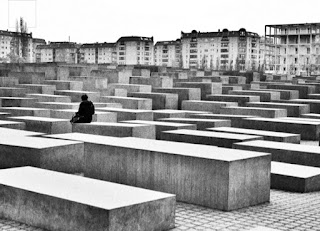Art Evokes Emotions | On Plato and Aristotle
Photos from: https://www.afar.com/places/memorial-to-the-murdered-jews-of-europe-berlin
In response to this week’s discussion, I will use the Memorial to the Murdered Jews of Europe made by Peter Eisenman to reflect my thoughts on the topic, but before that, I’d like to elaborate on the opinions of both Plato and Aristotle.
It was stated in the readings that Plato had a strong opinion regarding art because, for him, it is only a copy of the perfect thing in the world of forms and not the authentic truth that one pertains to. He also questioned its use because art has the power to induce powerful emotions that could help people deviate from their roles in society. Although an art piece aims to be created just for the interest of aesthetic appeal, it is nonetheless important to note that it is not entirely useless in my opinion, as it evokes emotions that could help human beings understand their world and their situations better to act righteously, and this is similar to how Aristotle views art.
The memorial may look aesthetically pleasing when viewed from afar, but it holds a deeper significance. The lined slabs look like a maze are a simulation of what the victims would have felt during their stay in concentration camps. It can make people feel disoriented, lost, and especially emotionally vulnerable as it makes us comprehend (albeit not to the full extent) what went down in the past and for its message to be borne in our hearts as a reminder to not repeat those same mistakes again. Art can make us realize certain aspects of life that would not be obvious if we only use our reason to comprehend it. It opens up the relationship of human beings in the world that we traverse and allows us to see the beauty of living.


0 (mga) komento:
Post a Comment